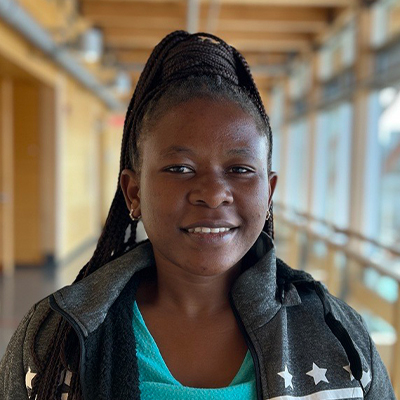Products and Markets
This research axis will lead to the development of new products, such as wood-based composite panels that are more heat-resistant, biodegradation-resistant, or feature stain-resistant and bacteria-resistant surfaces. Additionally, this axis will facilitate implementing new management, decision support, and control tools within the industry.
Project Identification: AXE3M6
Theme: Product Development – Panels
Status: In progress since January 2024
Details
Student: Flore Simon
Supervisor: Alain Cloutier (Université Laval)
Co-supervisor: Franck Michaud (École Supérieure du Bois - ESB, France)
Collaboration: Ahmed Koubaa (UQAT), Papa Diouf (SEREX)
Industrial Partners: FPInnovations, Arbec Forest Products
Research Partners: Renewable Materials Research Centre (CRMR), ESB, SEREX, UQAT
Email: flore.simon.1@ulaval.ca
Description
In North America, oriented strand boards (OSB) are primarily used in residential construction and renovation, notably in subfloors, walls, roofs, and medium-rise non-residential buildings. OSB are structural panels with high mechanical performance but are susceptible to moisture and mold without appropriate treatments. Mold can weaken the material's structure, reduce mechanical strength, and cause deformation or panel rupture. Developing panels that are more resistant to mold is an advantage for the Canadian industry, enabling them to offer more high-performance and durable products and enhance competitiveness in the market.
This project aims to assess and optimize using one or more fungicidal treatments capable of increasing OSB's resistance to mold while preserving the panel's original physical and mechanical properties. The project will prioritize using fungicidal products free from volatile organic compounds, toxic substances, and solvents, allowing for recycling strands or panels treated at the end of their lifecycle.

Student: Flore Simon
Project Identification: AXE3DOC9(M)
Theme: Product Development – Coating
Status: In progress since May 2024
Details
Student: Salsabil Hadhiri
Supervisor: Véronic Landry (Université Laval)
Co-supervisor: Diego Mantovani (Université Laval)
Collaboration: Ingrid Calvez (Université Laval), Papa Diouf (SEREX), Reza Jafari (UQAC), Gabrielle Boivin (FPInnovations)
Industrial Partners: SACOPAN, Tafisa, Uniboard
Research Partners: Renewable Materials Research Centre (CRMR), SEREX
Email: salsabil.hadhri.1@ulaval.ca
Description
Melamine laminated particleboard has excellent performance characteristics such as impact and chemical resistance. Most surfaces must meet high hygiene requirements in some environments such as hospitals and kitchens. Although melamine-coated surfaces are relatively easy to clean, there is a need to improve their antimicrobial properties. The antibacterial coating must be easy to clean and maintain, durable, and long-lasting.
This project aims to develop a low volatile organic compounds antibacterial coating for melamine laminate panels that is effective, durable over time, and safe for humans and the environment. The coating shall be composed of a polymer system with antibacterial properties. Ideally, the antimicrobial additives will be immobilized in a resin matrix, so they are not washed during cleaning. This may involve using metal compounds such as metal and metallic oxides, ions, or nanoparticles. It is also possible to achieve an antibacterial surface by chemically modifying a surface with bactericidal functionalities, such as quaternary amine compounds or phosphonium salts, which can kill bacteria on contact. The best strategy will be evaluated, and the antibacterial coatings will be applied to the panel surface. Physical (e.g., hardness, adhesion, abrasion resistance, etc.), chemical (e.g., chemical resistance), and antibacterial properties will be evaluated.

Student: Salsabil Hadhri
Project Identification: AXE3DOC10
Theme: Product Development – Coating
Status: In progress since mai 2024
Details
Student: Raissa Ngwane Tchanyo
Supervisor: Véronic Landry (Université Laval)
Co-supervisor: Caroline Szczepanski (MSU)
Collaboration: Ingrid Calvez (Université Laval), Gelareh Momen (UQAC), Gabrielle Boivin (FPInnovations)
Industrial Partners: SACOPAN, Tafisa, Uniboard
Research Partners: Renewable Materials Research Centre (CRMR)
Email: raissa.tchanyo.1@ulaval.ca
Description
The surface quality for melamine products varies depending on the product's final use. For high-end products, the finish is often considered one of the most important aspects in terms of visual appearance and outstanding quality. In this context, adding a fingerprint-resistant property could prevent unsightly fingerprint marks on surfaces and reduce the necessary cleaning. Finishes with hydrophobic and oleophobic properties can provide fingerprint-resistant performance that enhances the aesthetic appeal and ease of maintenance.
This project aims to develop a low-volatile organic compound concentration fingerprint-resistant finishing product for laminated melamine panels. This finish should be durable over time and safe for humans and the environment. Several strategies exist for achieving fingerprint-resistant surfaces. Hierarchically rough surfaces, especially those with micro and nanoscale roughness and low surface-free energies, can lead to high contact angles with water and oil. On the other hand, surfaces enriched with low surface tension polymers (e.g., poly(dimethylsiloxane)) can facilitate cleaning. The best strategy will be studied, and the hydrophobic and oleophobic properties will be tested, along with coating properties (hardness, adhesion, abrasion resistance, etc.).

Student: Raissa Ngwane Tchanyo
Project Identification: AXE3M19(DOC)
Theme: Product Development – Coating
Status: Pending
Details
Student: Hossein Alinezhad
Supervisor: Véronic Landry (Université Laval)
Co-supervisor: Diego Mantovani (Université Laval)
Collaboration: Ingrid Calvez (Université Laval), Papa Diouf (SEREX), Gabrielle Boivin (FPInnovations)
Industrial Partners: SACOPAN, Tafisa, Uniboard
Research Partners: Renewable Materials Research Centre (CRMR), SEREX
Email: hossein.alinezhadavalzali.1@ulaval.ca
Description
Melamine-laminated particleboards exhibit excellent performance characteristics such as impact and chemical resistance. Their ease of maintenance makes them a preferred choice for high-traffic environments such as hospitals, medical offices, schools, or restaurants. To ensure surface hygiene and limit the proliferation of viruses, the development and application of an antiviral finish are necessary. The finish should be easy to clean and maintain, as well as resistant and long-lasting.
This project aims to develop a low volatile organic compound concentration antiviral finish for melamine-laminated panels that is effective, durable over time, and safe for humans and the environment. The finish will consist of a polymer system with antiviral properties. This may involve grafting polycations onto the surface, which can be of natural origin (e.g., chitosan) or synthetic (e.g., polyethyleneimine - PEI), or the use of metal compounds (e.g., ions, oxides, or metal nanoparticles). The antiviral coatings will be applied to the panel's surface, and their physical properties (e.g., hardness, adhesion, abrasion resistance, etc.), chemical properties (e.g., chemical resistance), and antiviral properties will be evaluated.
Project Identification: AXE3M18(SPD)
Theme: Decision Support Tools
Status: In progress since July 2024
Details
Postdoctoral Fellow: Gustavo Enrique Rodriguez Rivero
Supervisor: Alain Cloutier (Université Laval)
Collaboration: Aziz Langhdir (SEREX), Évelyne Thiffault (Université Laval), Sylvain Volpe (FPInnovations), Rosilei Garcia (Université Laval)
Industrial Partners: Uniboard, Tafisa, FPInnovations
Research Partners: Renewable Materials Research Centre (CRMR), SEREX
Email: gustavo-enrique.rodriguez-rivero.1@ulaval.ca
Description
Biomass storage is a crucial step in the panel industry as it ensures a continuous supply of raw materials for production. However, stacking biomass can create conditions conducive to natural physicochemical and biological phenomena that can lead to economic losses, environmental impacts, and risks to the health and safety of factory workers. Problems related to biomass storage include the loss of raw material due to degradation by bacteria and fungi, the production of greenhouse gases (carbon dioxide, methane, and carbon monoxide) harmful to health, and the risks of spontaneous combustion and fires due to the heat emitted by the metabolic activity of bacteria and fungi during biomass decomposition. Biomass degradation can also affect panel properties.
This project aims to understand better the factors influencing temperature rise and the risks of spontaneous combustion in biomass stacks, to study the effect of temperature rise on raw material quality and panel properties, and to develop a simulation model of temperature and gas concentration to monitor and prevent biomass degradation and potential fires.
Postdoctoral Fellow: Gustavo Enrique Rodriguez Rivero
Project Identification: AXE3DOC8
Theme: Decision Support Tools
Status: In progress since January 2024
Details
Student: Tiam Mahmoudian
Supervisor: Alain Cloutier (Université Laval)
Co-supervisor: Aziz Laghdit (SEREX)
Collaboration: Louis Gosselin (Université Laval), Rosilei Garcia (Université Laval)
Industrial Partners: Uniboard, Tafisa
Research Partners: Renewable Materials Research Centre (CRMR), SEREX
Email: tiam.mahmoudian.1@ulaval.ca
Description
Wood-based panels used for external cladding (siding) are exposed to variations in temperature and humidity that can affect the material's durability and the building's energy performance. Adequate permeability enables panels to have higher dimensional stability following variations in temperature and humidity. This characteristic reduces the risk of warping and increases the durability of the cladding, in addition to providing better thermal performance. The exterior cladding performance also depends on panel type and characteristics.
This project aims (1) to better understand the relationship between permeability and tolerance to variations in temperature and humidity of two types of exterior cladding panels (particleboard and medium-density fiberboard - MDF) while identifying the strengths and weaknesses of each one and (2) to develop a mathematical model to simulate the behavior of panels in service.

Étudiante: Tiam Mahmoudian
Project Identification: AXE3DOC15
Theme: Product development - Panels
Status: In progress since January 2025
Details
Student: Agathe Moysan
Supervisor: Alain Cloutier (Université Laval)
Co-supervisor: Véronic Landry (Université Laval)
Collaboration: Gabrielle Boivin (FPInnovations), Roger Hernández (Université Laval)
Industrial Partners: Uniboard
Research Partners: Renewable Materials Research Centre (CRMR)
Email: agathe.moysan.1@ulaval.ca
Description
Our industrial partner markets exterior MDF products that are bonded with pMDI resin. This resin type offers various advantages, such as rapid curing during hot pressing, absence of formaldehyde, high adhesion with low resin content, and excellent water resistance. However, MDF panels bonded with pMDI resin are less machinable and may have issues with paint absorption.
The objective of this project is to find ways to enhance the machinability and surface quality of MDF panels that are manufactured with pMDI. The goal is to achieve surface properties comparable to those of panels produced with phenolic resins. In this study, various panel surface properties will be evaluated, including wettability and surface energy through contact angle measurement, roughness through 3D optical profilometry, and surface structure through high-resolution digital microscopy from Keyence. Finally, the relationship between machinability, the physicochemical properties of the panel surface, and the absorption of paint or other finishing products will be determined.
Student: Agathe Moysan
Status: Concluded
Date: September 05, 2023 to May 05, 2024
Details
Student: Yeray Lopez Gomez
Program: Doctorate, University of Eastern Finland
Supervisor: Alain Cloutier (Université Laval), Antti Haapala (University of Eastern Finland)
Collaboration: Aitor Barbero Lopez (University of Eastern Finland)
Industrial Partners: Arbec Forest Products
Research Partners: Renewable Materials Research Centre (CRMR), University of Eastern Finland
Email: yeray.lopez.gomezef.fi
Description
The project's goal is to develop an innovative approach to improving the performance of oriented strand board (OSB) using biobased preservatives. OSB panels are commonly used in construction and other non-structural applications. This study seeks to improve their overall quality and durability.
The main objective is to evaluate biobased preservatives' impact on the main characteristics of OSB panels. These include mechanical properties, which are essential for structural integrity; internal bonding, which has a major impact on the panel's overall strength; dimensional stability, which is crucial for maintaining the panel's physical integrity over time; and resistance to decay, which is essential for ensuring the panel's long-term use.
The research will provide information on the potential benefits and challenges of incorporating biobased preservatives into OSBs. It will thus contribute to a better understanding of sustainable and environmentally friendly alternatives for protecting wood-based composite panels while addressing environmental concerns and ensuring the durability of these essential materials in various applications.
Status: Concluded
Date: May 15th to September 1st, 2023
Details
Student: Pascal Houde
Program: Cooperative Bachelor's Degree in Wood Engineering
Supervisor: Alain Cloutier (Université Laval)
Collaboration: Rosilei Garcia (Université Laval)
Industrial Partners: Tafisa, Uniboard
Research Partners: Renewable Materials Research Centre (CRMR)
Email: pascal.houde.4@ulaval.ca
Description
This internship supported the AXE3M18 Ph.D. project entitled "Study of temperature rise in biomass stacks: effects on panel properties and modeling." The internship activities included (a) a literature review on the temperature rise phenomenon in biomass stacks and the preparation of a synthesis; (b) a survey of industrial partners on the practices adopted in this subject; (c) preliminary tests; and (d) writing of a final report.
Status: Concluded
Date: May 1st to September 1st, 2023
Details
Student: William Côté
Program: Bachelor's Degree in Forest Management and Environmental Sciences
Supervisors: Évelyne Thiffault (Université Laval), Alain Cloutier (Université Laval)
Industrial Partners: Tafisa, FPInnovations
Research Partners: Renewable Materials Research Centre (CRMR)
Email: william.cote.9@ulaval.ca
Description
This internship was carried out supporting several Corepan-Bois research projects. The objectives of the internship were: (a) to document current practices in Quebec regarding the production of particleboard and MDF; (b) to conduct a carbon balance from the source of raw material supply to the end of the product's life, comparing three types of raw materials (forest biomass, post-consumer wood residues, and residues from primary and secondary processing); and (c) to simulate different scenarios of raw material use (e.g., pulp and paper, energy, and panels) to understand and document the role of the panel industry in carbon sequestration and fight against climate change. Simulations in carbon pathways in wood products were carried out using the FHWP (Forest Harvested Wood Products) module of the CBM-CFS3 software.